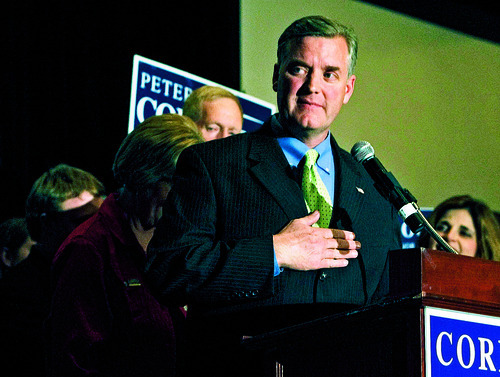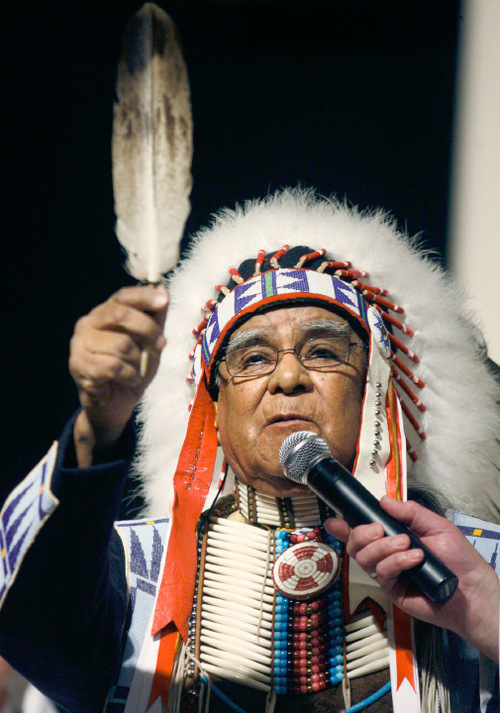This is an archived article that was published on sltrib.com in 2010, and information in the article may be outdated. It is provided only for personal research purposes and may not be reprinted.
Peter Corroon wasn't so popular on Election Day.
The soft-spoken Salt Lake County mayor — whose rejection of a Real Salt Lake soccer stadium deal earned him Jon Huntsman Jr.-like popularity during his first term and helped him coast to a second — failed to win even his own county in his campaign for governor.
Even political newcomer Sam Granato, a Democratic underdog candidate for U.S. Senate, won more county votes with a considerably cheaper campaign ($251,000 compared with $2.1 million, according to the latest financial disclosures).
"Honestly, that was a disappointment to me," Corroon concedes. "It was a disappointment that a majority of Salt Lake County citizens didn't vote for me."
So what went wrong? What would lead this high-profile Democrat — whom politicos consider one of the pre-eminent faces of Utah's minority party — to lose his own county by more than 10,000 votes and the state by a 34-percentage-point margin?
"For him to lose the county," says Tom Love, president of Love Communications, "has to say the strategy went south somewhere."
It's an outcome that some attribute to voter dissatisfaction with Democrats nationally. Republicans recaptured the U.S. House, picking up more than 60 seats in what Corroon characterizes as an "anti-Democratic tsunami." That sentiment, they say, reached the Utah governor's race.
But political observers say other factors also may be to blame: A campaign that was perceived as too negative for too long, advertising that didn't effectively present Corroon as the better choice for governor, a police fee that may have turned Salt Lake County residents against their mayor and a Republican incumbent who had established a mostly favorable statewide reputation.
"We ran what I think was an aggressive campaign," says campaign manager Donald Dunn, sitting in an office on South Temple now cluttered with boxes ready to move. "It was an issue-focused campaign. It was a campaign that reached out to people across the state. It was a campaign that was competitive."
Still taped to a window in that campaign office is an editorial cartoon depicting Gov. Gary Herbert beneath the bed covers with a political donor. The story behind that satire — namely, questions about whether the governor was giving special treatment to campaign contributors — has become the focal point of critics who say Corroon's handling of the controversy may have led to his lopsided loss.
Shortly after news broke about an alleged connection between Herbert's campaign donations and the award of state contracts and other benefits, the Corroon camp produced a television ad accusing the governor of being for sale.
When the story grew — the Utah Department of Transportation paid a $13 million settlement to a contractor who disputed the bidding process for an Interstate 15 project ultimately awarded to a Herbert donor — the campaign cranked out another ad.
"Gary Herbert is rewarding his top contributors rather than solving Utah's problems," the ad claims, "hurting our children most."
Kirk Jowers, director of the University of Utah's Hinckley Institute of Politics, says the problem wasn't necessarily the ad's tone.
"Corroon had to go negative at some point to have any chance of winning," Jowers says. "When your opponent is running 25 points ahead of you, a purely positive ad will not give you a chance to win, absent the front-runner destroying himself or herself."
The problem, he says, was the follow-up. Corroon was unable to craft an effective message to tell voters why he would do a better job.
"He didn't give voters a reason to hire him as governor," says Quin Monson, associate director of Brigham Young University's Center for the Study of Elections and Democracy. "We never got the acceptable alternative."
Dunn insists the campaign tried to do just that. It ran hard-hitting ads for a week in mid-September and another week in early October, but ended the campaign with two weeks of spots touting the bipartisanship of the Democratic ticket (which offered Rep. Sheryl Allen, a Bountiful Republican, as lieutenant governor).
Leafing through a campaign budget, Dunn says the campaign spent $259,000 on the harder ads, compared with $775,000 on TV spots that focused entirely on Corroon and Allen. In addition, he says, the camp unveiled five policy papers on energy, education, government efficiency, quality of life and the economy.
What went wrong, Dunn counters, is that media outlets, pundits and community power brokers turned on Corroon as a negative campaigner.
"We were working against a machine," he says, "and all the talking heads were in sync."
Dunn also notes that voter turnout was dismally low with only 33.2 percent of voting-age Utahns showing up at the polls. That turnout, combined with the Republican resurgence, dealt the campaign a painful blow.
But there is something else, political scientists say, that may have contributed to Corroon's defeat: Herbert. The governor was well known outside of Salt Lake County. He hadn't done anything to anger voters enough to fire him. And he was a Republican during a Republican year.
"Maybe we are making too much of Corroon's missteps," Monson says. "Maybe, in all fairness, Herbert wasn't that vulnerable."
Now, as Corroon enters his final two years as mayor — he wonders if his poor showing in Salt Lake County had something to do with an unpopular police fee imposed on unincorporated suburbs — he has renewed his pledge not to seek a third term.
The question is, will his defeat cause him any long-term political damage? Will he be weakened as a new Republican-controlled County Council takes office in January? Will his political future within the Democratic Party be affected?
Republican Councilman Max Burdick, who likely will become the new chairman in January, sees no change in how the council will interact with the mayor.
"We all need to know our place in county government," he says. "The council has its role. The Mayor's Office has its role. I don't think we should run over to the Mayor's Office and try to run Salt Lake County government."
As for his political future — Corroon says he hasn't contemplated a run for U.S. Senate or House or any other office — Monson responds simply when asked whether the party might be wary of running him again.
"Well," Monson asks, outside of Rep. Jim Matheson, "who else is there?"
So Corroon is preparing for two more years that he hopes will include more alternatives to incarceration, the development of three more regional parks, the preservation of more open space along the Jordan River, the completion of libraries and recreation centers, and more.
What he doesn't plan to be is a lame duck.
"Idle hands are the devil's workshop," Corroon says. "And I have no interest in being in the devil's workshop."
Voices on Corroon's loss
"Mayor Corroon never really took the opportunity to define himself. Gov. Herbert's campaign was all about Gov. Herbert. But so was Mayor Corroon's." — Kirk Jowers, director of the Hinckley Institute of Politics at the University of Utah
"A federal anti-Democratic tsunami hit the nation. That was the biggest issue." — Salt Lake County Mayor Peter Corroon
"People weren't quite sure whether a change was necessary from Herbert to Corroon. They didn't think things were going badly." — Salt Lake County Democratic Councilman Jim Bradley
"Peter's campaign did a good job of asking legitimate questions. What I don't think Peter's campaign did was prove why he was the better alternative." — Tom Love, president of Love Communication
"We were working against a machine. And all the talking heads were in sync." — Corroon campaign manager Donald Dunn
"Maybe we are making too much of Corroon's missteps. Maybe, in all fairness, Herbert wasn't that vulnerable." — Quin Monson, associate director of the Center for the Study of Elections and Democracy at Brigham Young University —
Voices On Corroon's loss
"Mayor Corroon never really took the opportunity to define himself. Gov. Herbert's campaign was all about Gov. Herbert. But so was Mayor Corroon's."
Kirk Jowers
Director of the Hinckley Institute of Politics at the University of Utah
"A federal anti-Democratic tsunami hit the nation. That was the biggest issue."
Peter Corroon
Salt Lake County Mayor
"People weren't quite sure whether a change was necessary from Herbert to Corroon. They didn't think things were going badly."
Jim Bradley
Salt Lake County Democratic councilman
"Peter's campaign did a good job of asking legitimate questions. What I don't think Peter's campaign did was prove why he was the better alternative."
Tom Love
President of Love Communication
"We were working against a machine. And all the talking heads were in sync."
Donald Dunn
Corroon campaign manager
"Maybe we are making too much of Corroon's missteps. Maybe, in all fairness, Herbert wasn't that vulnerable."
Quin Monson
Associate director of the Center for the Study of Elections and Democracy at Brigham Young University





